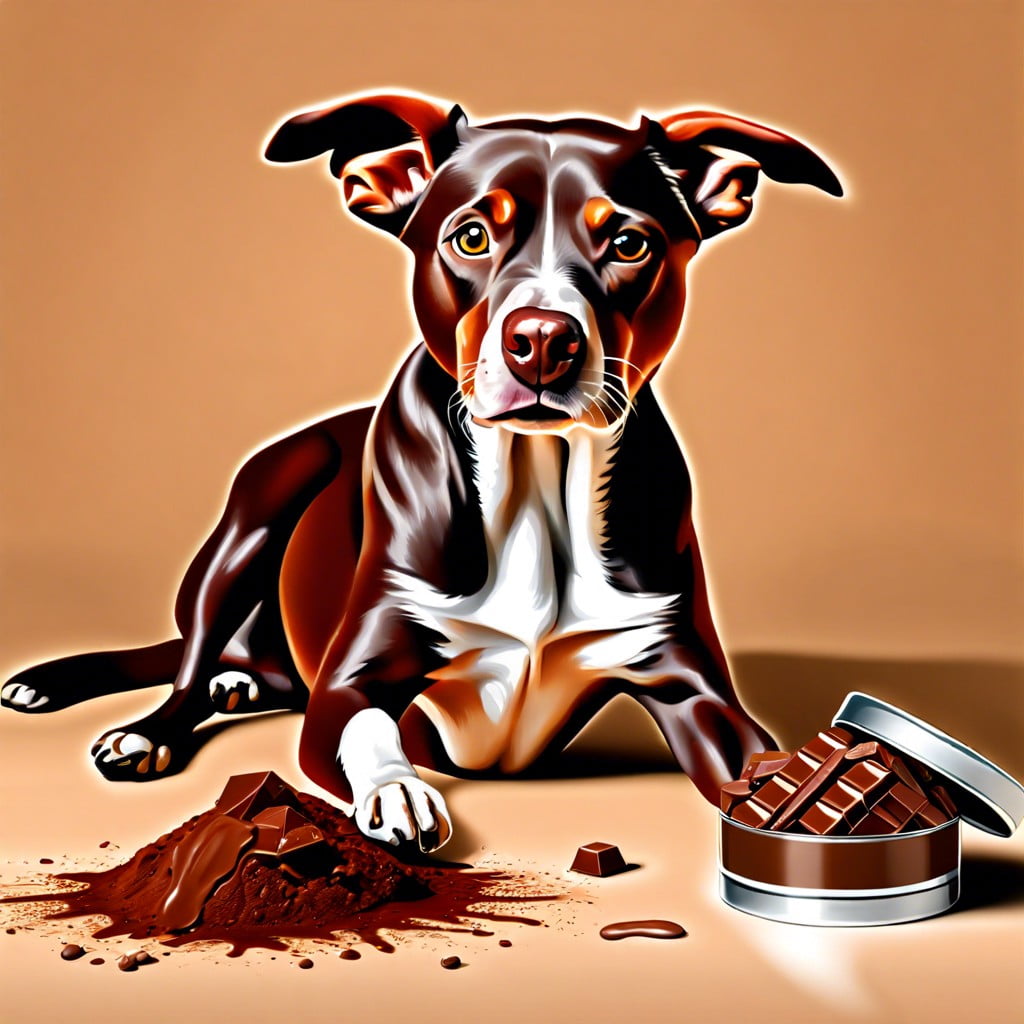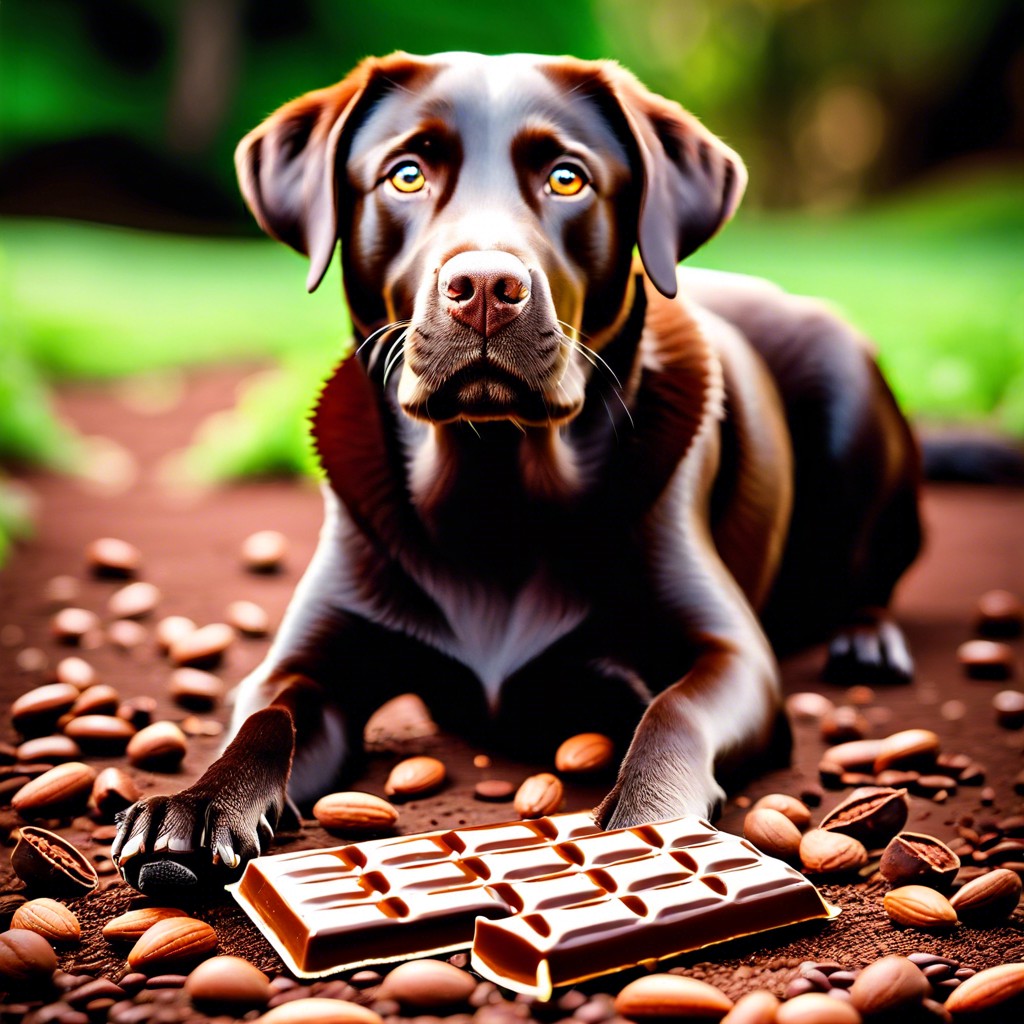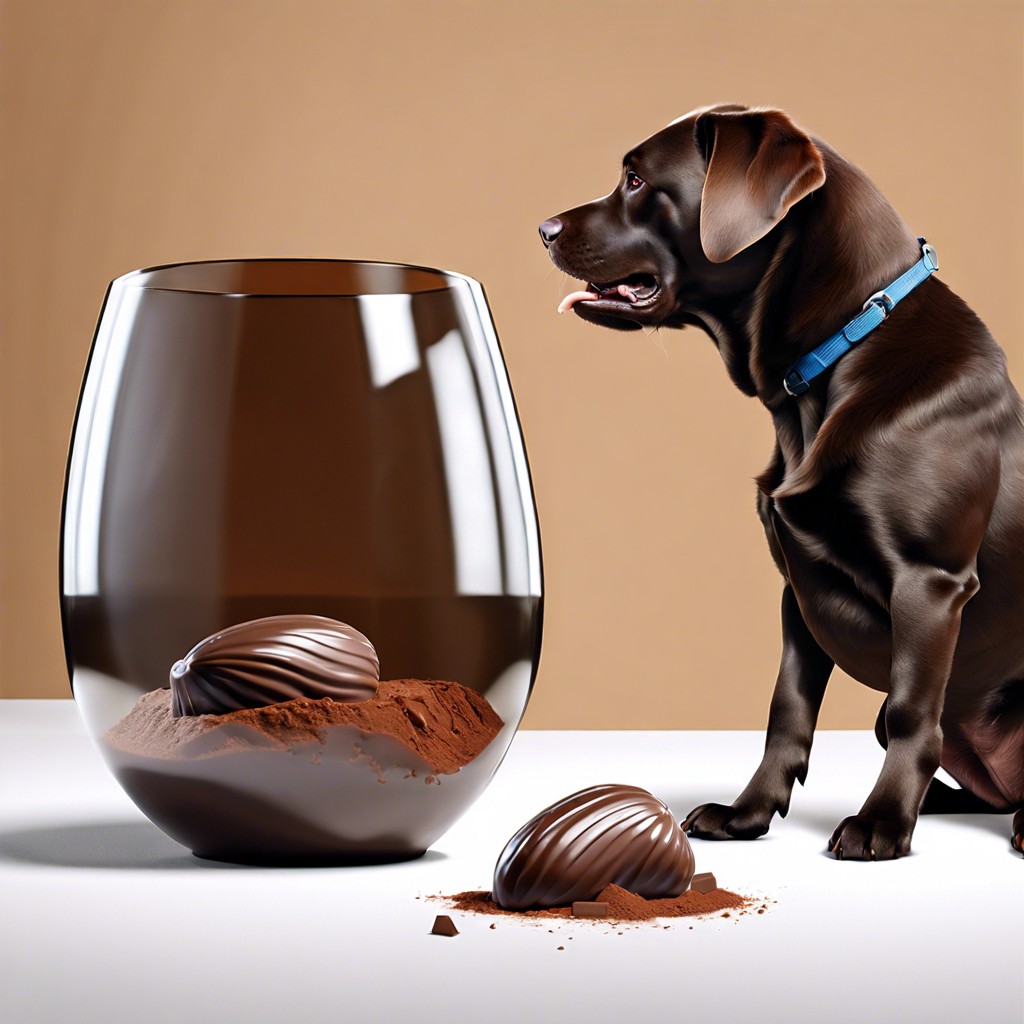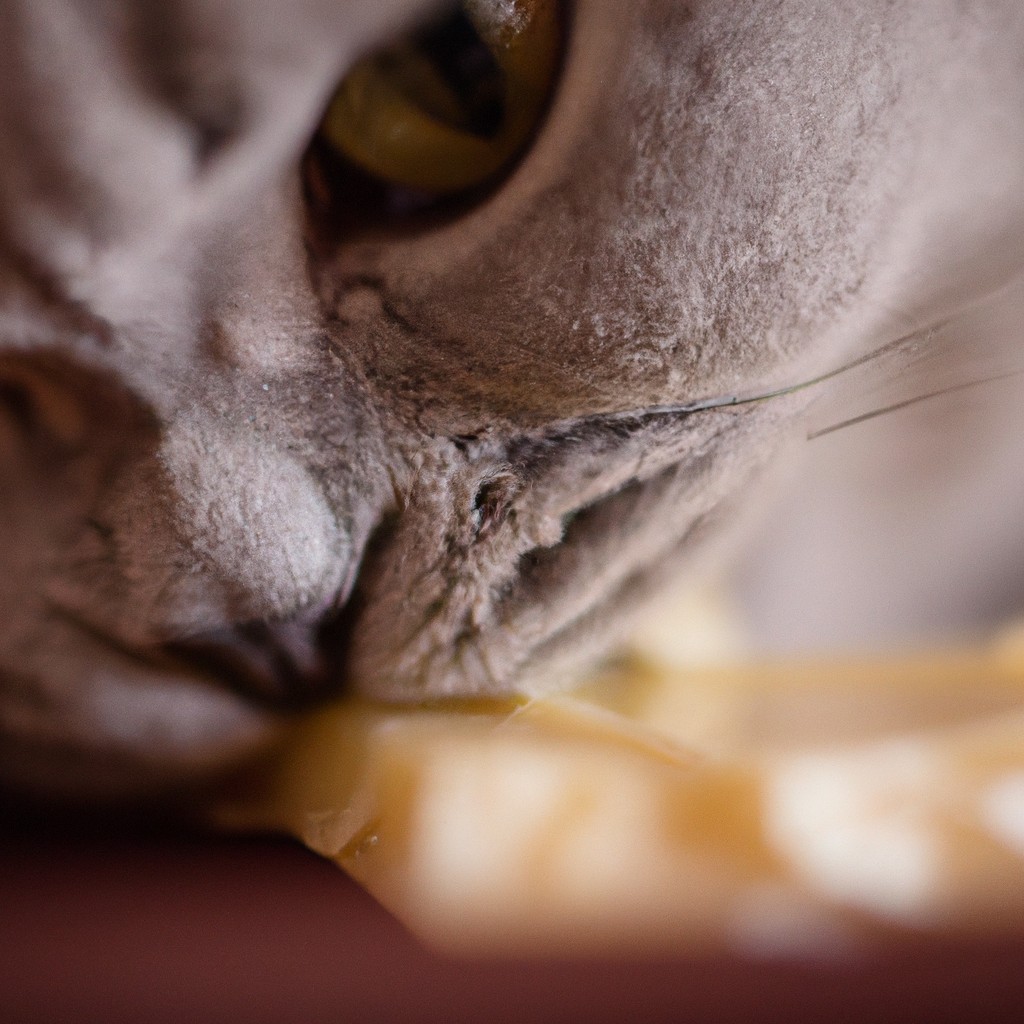No, chocolate is harmful to guinea pigs due to its caffeine and theobromine content.
Guinea pigs, despite their adorable cravings, should not be fed chocolate. It’s a hard ‘no’ due to the caffeine and theobromine present in chocolate, which are harmful to guinea pigs.
Reading on, you’ll find detailed explanations about why these substances are dangerous, what could happen if your pet ingests them, and healthier, safer alternatives for treats.
Key takeaways:
- Chocolate is harmful to guinea pigs.
- Caffeine and theobromine in chocolate can cause serious health issues.
- Guinea pigs have sensitive digestive systems and can’t metabolize chocolate effectively.
- If guinea pigs consume chocolate, immediate action should be taken.
- Stick to a proper guinea pig diet of hay, pellets, and fresh vegetables.
Inside
The Risks of Chocolate for Guinea Pigs
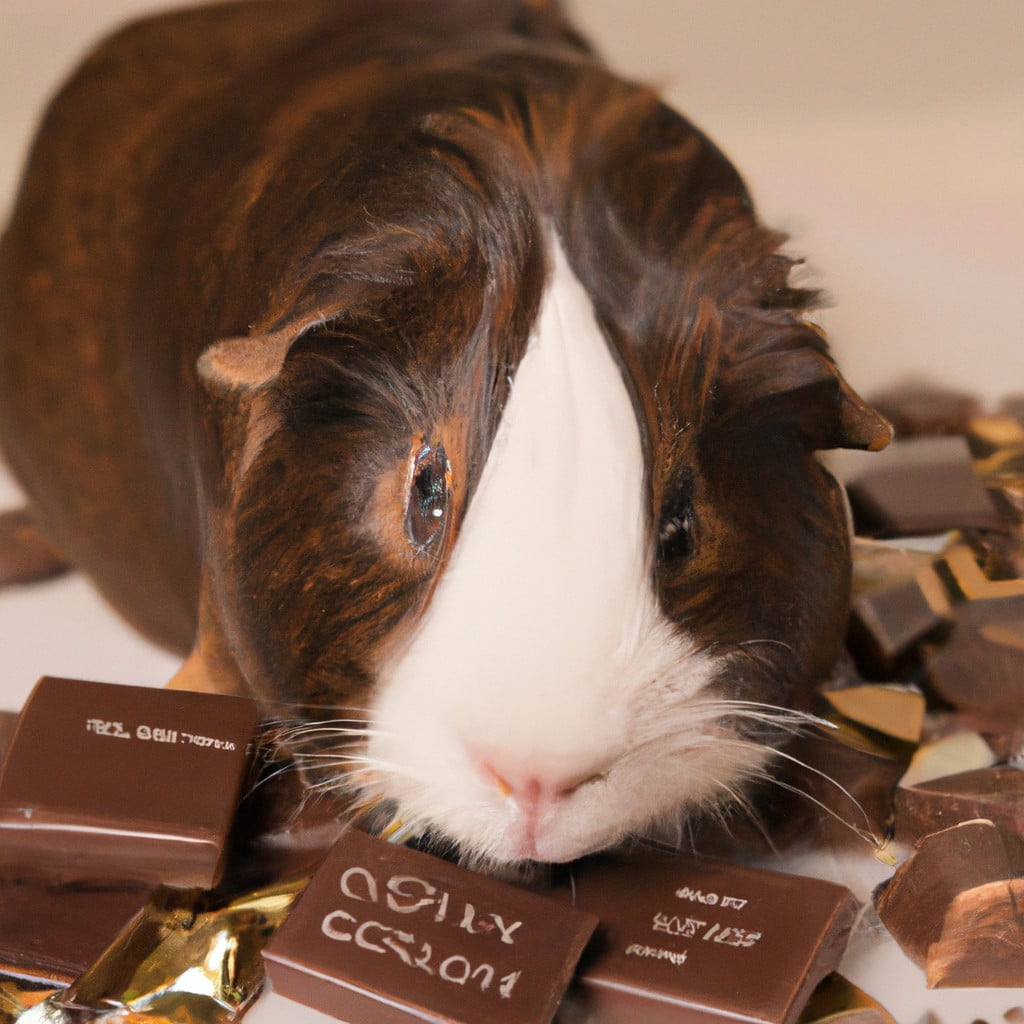
Chocolate contains substances that are toxic to guinea pigs: caffeine and theobromine. Ingestion of these can lead to serious health issues.
Caffeine can cause elevated heart rates and restlessness in guinea pigs, while an overload of theobromine can lead to a variety of symptoms such as diarrhea, shaking, heavy panting, and in severe cases, seizures or even death.
These small animals have sensitive digestive systems. Even the tiniest piece of chocolate can trigger complications, such as indigestion or bloating, which can lead to discomfort and other illnesses.
Given their size, guinea pigs cannot metabolize the sugar and fats in chocolate effectively. This inability can result in quick weight gain and the potential development of diabetes or heart disease.
Regrettably, guinea pigs cannot communicate when they’re feeling ill. It may be challenging to discern whether they have consumed something harmful, such as chocolate. It is essential to monitor your pet’s behavior for any unusual changes closely.
If you suspect your guinea pig has consumed chocolate, immediate action needs to be taken to mitigate the risk and reduce potential harm. Contact your local vet or a pet poison helpline for advice. Prompt treatment can often prevent the situation from worsening.
In light of these risks, chocolate should be eliminated as a potential treat for guinea pigs. There are many other safe, guinea pig-approved foods and treats that they will relish, whilst also aiding their health and well-being.
Understanding guinea pigs’ dietary preferences and nutritional needs will further ensure their safe and healthy consumption habits.
Effects of Chocolate On Guinea Pig’s Health
Cocoa, the main ingredient in chocolate, poses notable health risks for guinea pigs. Firstly, theobromine and caffeine, both found in cocoa, are toxic to these creatures. Ingestion can lead to various serious conditions such as diarrhea, seizures, heart irregularities and in severe cases, fatality.
Secondly, guinea pigs have a different digestive system compared to humans. Chocolate, being high in fats and sugars, is hard for them to process, resulting in gastrointestinal complications like bloating, painful gas, and constipation.
Additionally, chocolate can cause rapid weight gain and obesity in guinea pigs, leading to further health complications including joint problems and diabetes.
For these reasons, chocolate must never be included in a guinea pig’s diet. It’s essential to be vigilant and ensure all chocolate items are kept well out of their reach. In case of accidental ingestion, immediate veterinary care is necessary.
Instead, opt for feeding these pets with their natural diet comprised of timothy hay, leafy greens, high-quality guinea pig pellets, and occasional fruits. By doing so, not only are their dietary needs met, but it will also help them maintain an ideal weight and overall good health.
The Role of Caffeine and Theobromine in Chocolate
Caffeine and theobromine are naturally present in cocoa, the primary ingredient of chocolate. Though well-tolerated in humans, these substances could potentially pose serious health risks to guinea pigs.
Caffeine is a stimulant that may cause rapid heartbeat and restlessness. Excessive caffeine can lead to serious heartbeat irregularities in guinea pigs, which have a naturally high metabolic rate.
Theobromine is even more toxic to guinea pigs. This compound affects the central nervous system and cardiovascular system. It can cause breathing difficulties, irregular heartbeat, seizures, or even death.
Chocolate, even in small amounts, delivers a concentrated dose of caffeine and theobromine. This makes it a health hazard for your guinea pig to consume.
Always take precaution when having chocolate around your pet. They might be tempted by sweets, but the consequences can be severe. If your guinea pig has ingested chocolate, it is crucial to contact a vet immediately. They will likely need medical intervention to recover.
Do remember that your guinea pig’s diet should focus on fresh hay, fresh fruits and vegetables, and high-quality guinea pig pellets. Keep chocolate and other harmful foods out of their reach to ensure their safety and longevity.
Chocolate and Guinea Pig’s Digestive System
Guinea pigs boast an intricate digestive system designed for a diet filled predominantly with roughage, like hay and grass. With a distinct lack of critical liver enzymes needed to metabolize theobromine found in chocolate, their systems are at risk.
Ingesting chocolate can lead to blockages in their digestive tract. This is due to the high-fat content in chocolate which may cause severe constipation resulting in pain and discomfort.
The sugar concentration in chocolate – even in small amounts – can disrupt the delicate balance of bacteria in their guts, possibly leading to severe digestive upset or even stasis, where the gut ceases to function.
Furthermore, the stimulating effects of both caffeine and theobromine found in chocolate can cause an upset stomach and gastrointestinal distress, resulting in a loss of appetite – a potentially fatal condition for guinea pigs.
In a nutshell, chocolate is a direct threat to the functioning of guinea pigs’ digestive system and should not be included in their diet. Providing them with a well-balanced nutritional diet filled with high fiber content can help them avoid digestive problems.
Types of Chocolate and Their Impact On Guinea Pigs: Dark, Milk, and White
Dark chocolate contains the highest amount of harmful substances, caffeine and theobromine. This type is especially toxic to guinea pigs and should be avoided at all costs. Even a tiny quantity can trigger health issues.
Milk chocolate, while having less caffeine and theobromine than dark chocolate, remains unsafe for guinea pigs. The milk content doesn’t nullify the harmful compounds and can contribute to digestive problems as guinea pigs are lactose intolerant.
Finally, white chocolate has minimal amounts of caffeine and theobromine, but is high in sugar and fat. Though not acutely toxic, it’s not suitable for guinea pigs due to its nutritional profile. Consumption can lead to obesity and other health problems.
Immediate actions include ensuring all types of chocolates are kept out of reach, or better yet, out of the same room as your guinea pig. In case of accidental ingestion, consult a vet immediately. Alternatives to chocolate as treats should be considered to keep your pet’s diet balanced and nutritionally sound.
Emergency Steps If a Guinea Pig Inadvertently Consumes Chocolate
Identify the signs of chocolate consumption in guinea pigs. These may include restlessness, rapid breathing, and unusual behavior. Immediate action is necessary to prevent health deterioration.
Contact a vet as soon as possible. Describe the situation accurately, especially the type of chocolate and the amount ingested. Any additional symptoms should not be overlooked.
Follow the advice of the vet strictly. This may involve inducing vomiting or administering activated charcoal. Remember, these options should be carried out only under professional guidance.
Never force more food or water into the guinea pig without vet’s instruction.
While waiting for the vet, keep the guinea pig in a calm and quiet environment. Stress can further increase heart rates leading to dangerous conditions.
Keep chocolate and other potentially harmful foods out of reach in the future to avoid similar incidents.
Remember, prevention is the safest option, and it is best to keep such foods out of reach of guinea pigs.
Proper Guinea Pig Diet and Nutrition
Guinea pigs are herbivores, relying primarily on greens, fruits, and specially designed pellets for nutrients.
Hay, particularly Timothy hay, should form the majority of their diet as it promotes healthy teeth and digestion.
Fresh vegetables like bell peppers, cucumbers, leafy greens, and carrots should also be included daily.
Fruits such as apples, strawberries and blueberries, rich in vitamin C, can be offered in small quantities due to their high sugar content.
Store-bought guinea pig pellets contain fortified nutrients and should be fed in regulated amounts.
Ensure their food is always fresh, opting for raw ingredients over cooked, and remove any uneaten food daily to avoid mould growth.
Avoid feeding them foods high in fats or sugars which can lead to obesity and digestive problems.
While small amounts of vegetables and fruits offer magnificent health benefits, excessive consumption can lead to diarrhoea.
Fresh, clean water should be readily available at all times through a standard drip water-bottle fixed inside their cage.
Alfalfa hay should only be given to growing or pregnant guinea pigs due to its high protein and calcium content.
Regular monitoring of their dietary intake is advised to ensure your guinea pig is eating healthily. Any sudden changes in their feeding habits should be discussed with a vet immediately.
Try to feed them at consistent times every day to help establish a feeding routine.
Lastly, remember that every guinea pig has its likes and dislikes, and it might take some experimentation to discover what they prefer.
Healthy Treat Alternatives for Guinea Pigs
Fruits and veggies make ideal treats for guinea pigs. However, aim to feed them these in moderation due to their high sugar content. Examples include cucumber, bell peppers, tomatoes, carrots, and small bits of apple or pear.
Hay-based treats are also a smart choice. Not only do these treats help wear down a guinea pig’s constantly-growing teeth, but they are also high in fiber which aids digestion.
Try offering fresh herbs such as parsley, cilantro, and mint. These are not only palatable for guinea pigs but also packed with vitamins.
Finally, pellet treats made specifically for guinea pigs can be a part of their diet. Be cautious of those containing colorants or sweeteners, as these are unhealthy. Always aim for natural ingredients when selecting pre-made treats.
While guinea pigs do enjoy a variety of foods, avoid sudden drastic changes to their diet. Introduce new foods gradually to prevent digestive upsets. Always wash fruits and vegetables thoroughly before feeding to remove traces of pesticides or other potentially harmful substances.
Understanding Guinea Pig’s Food Preferences
Guinea pigs have a distinct preference for fresh fruits and vegetables, which are critical to their diet. They enjoy a variety of vegetables such as bell peppers, tomatoes, cucumbers, and carrots. Fruits like apple, pear, and strawberries are also favored treats but should be offered in moderation due to their high sugar content.
Leafy greens such as lettuce, kale, and spinach form an essential part of their diet providing essential nutrients. However, like any pet, it’s important to pay attention to each individual guinea pig’s likes and dislikes when deciding what to feed them. Every guinea pig will have its own food preferences.
Hay holds a significant place in a guinea pig’s daily diet as it aids in digestion and keeps their teeth duly filed. Commercially prepared guinea pig pellets can also form part of their diet, being careful to choose varieties without added sugars and artificial additives.
Remember, fresh water must be available at all times for guinea pigs and their food bowls and water bottles should be kept clean to avoid bacteria build-up.
Avoid foods that are toxic to guinea pigs, including all types of chocolate, any dairy products, and certain types of vegetables and fruits, such as onions, garlic, and grapes.
When introducing new foods to a guinea pig’s diet, do so gradually to allow their digestive system to adjust and monitor for any signs of intolerance or allergy.
Guidelines for Feeding Treats to Guinea Pigs
Introduce new foods into a guinea pig’s diet gradually to observe any adverse reactions. Fresh fruits and vegetables can be offered in small amounts, remembering that these are supplements to daily hay and pellet meals. Avoid overfeeding as it can lead to obesity and other health problems.
Select treats that are high in fiber but low in fat and sugar, as guinea pigs are naturally herbivorous and require a diet rich in hay and low in sugar. Fruits, vegetables, and specially-formulated guinea pig treats are ideal.
Monitor guinea pig’s eating habits and droppings to ensure they react well to the new treats. Changes in these activities can be an indication of discomfort or illness.
Remove any uneaten portions of perishable treats from the guinea pig’s cage to prevent bacteria build-up.
Consider the size and hardness of treats as these can influence the health of a guinea pig’s teeth. Chewing on hard substrates like wood or hay helps to prevent overgrowth of their continuously-growing teeth.
Avoid any food item with artificial flavors, sweeteners, dyes, or preservatives. Also, treats laced with antibiotics, like yogurt drops, could upset the guinea pig’s sensitive gut flora.
Refer to your vet for the best diet and treat options suited for your guinea pig’s specific needs and conditions. Individual health status, age, or pregnancy might necessitate a modification in their treat consumption.
Be mindful of the fact that, like humans, guinea pigs may show preferences for specific treats over others. Not every guinea pig will appreciate the same kind of treat.
FAQ
Can guinea pigs have candy?
No, guinea pigs should not consume candy as it can harm their sensitive and fragile digestive systems.
Can guinea pigs eat cheese?
No, guinea pigs cannot eat cheese because their digestive system is not equipped to process dairy products.
What fruit can guinea pigs not eat?
Guinea pigs cannot eat dried fruit, including raisins, due to potential oral health issues and the risk of unnecessary weight gain from high sugar content.
Is dark chocolate safe for guinea pigs?
No, dark chocolate is not safe for guinea pigs as it contains caffeine and theobromine, both of which can be harmful to them.
What are the potential side effects if a guinea pig accidentally consumes chocolate?
If a guinea pig accidentally consumes chocolate, it may experience serious health issues like diarrhea, seizures, or even cardiac failure due to theobromine toxicity.
Are there any safe chocolate alternatives for guinea pigs?
No, guinea pigs should not consume chocolate or any chocolate alternatives due to the presence of harmful substances such as caffeine and theobromine.
